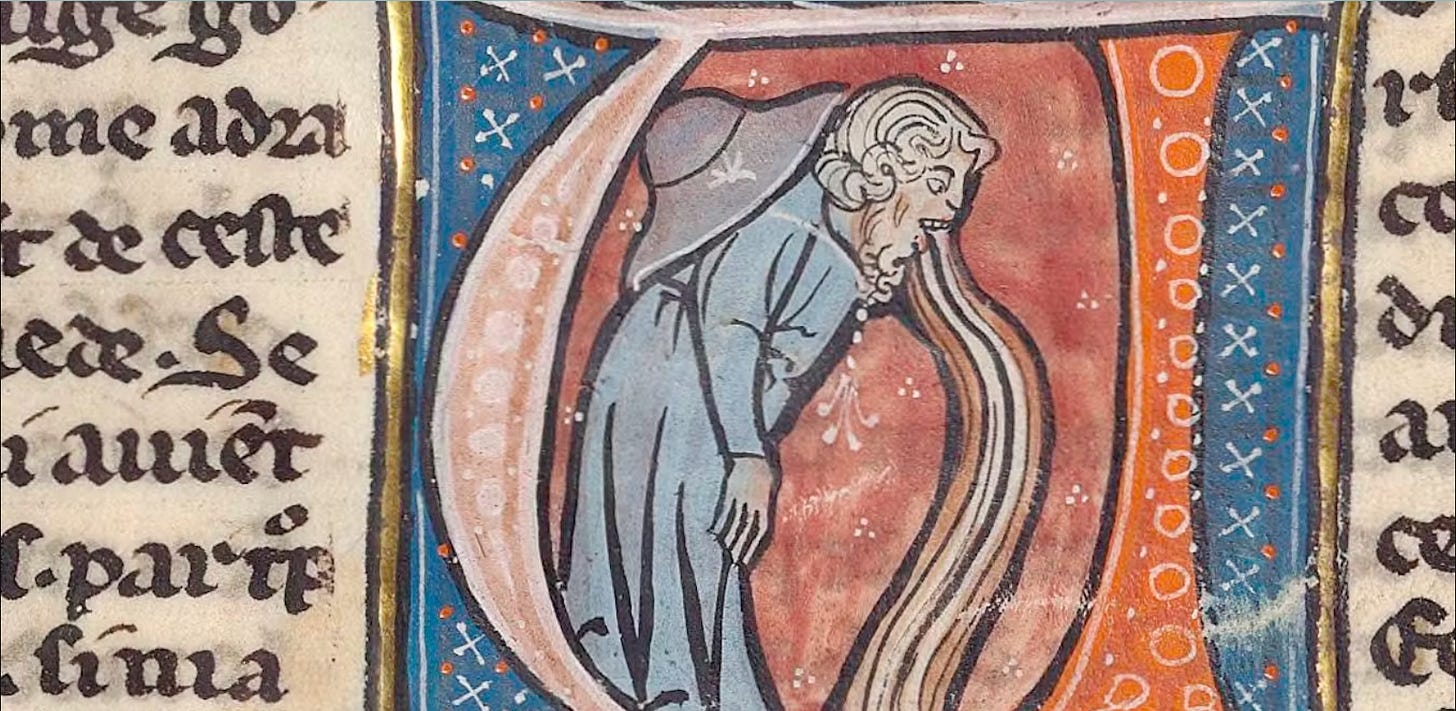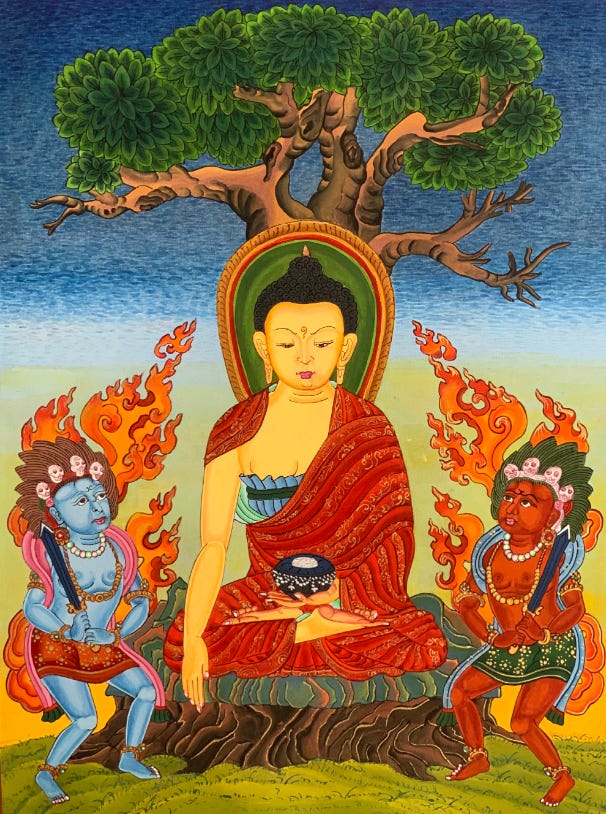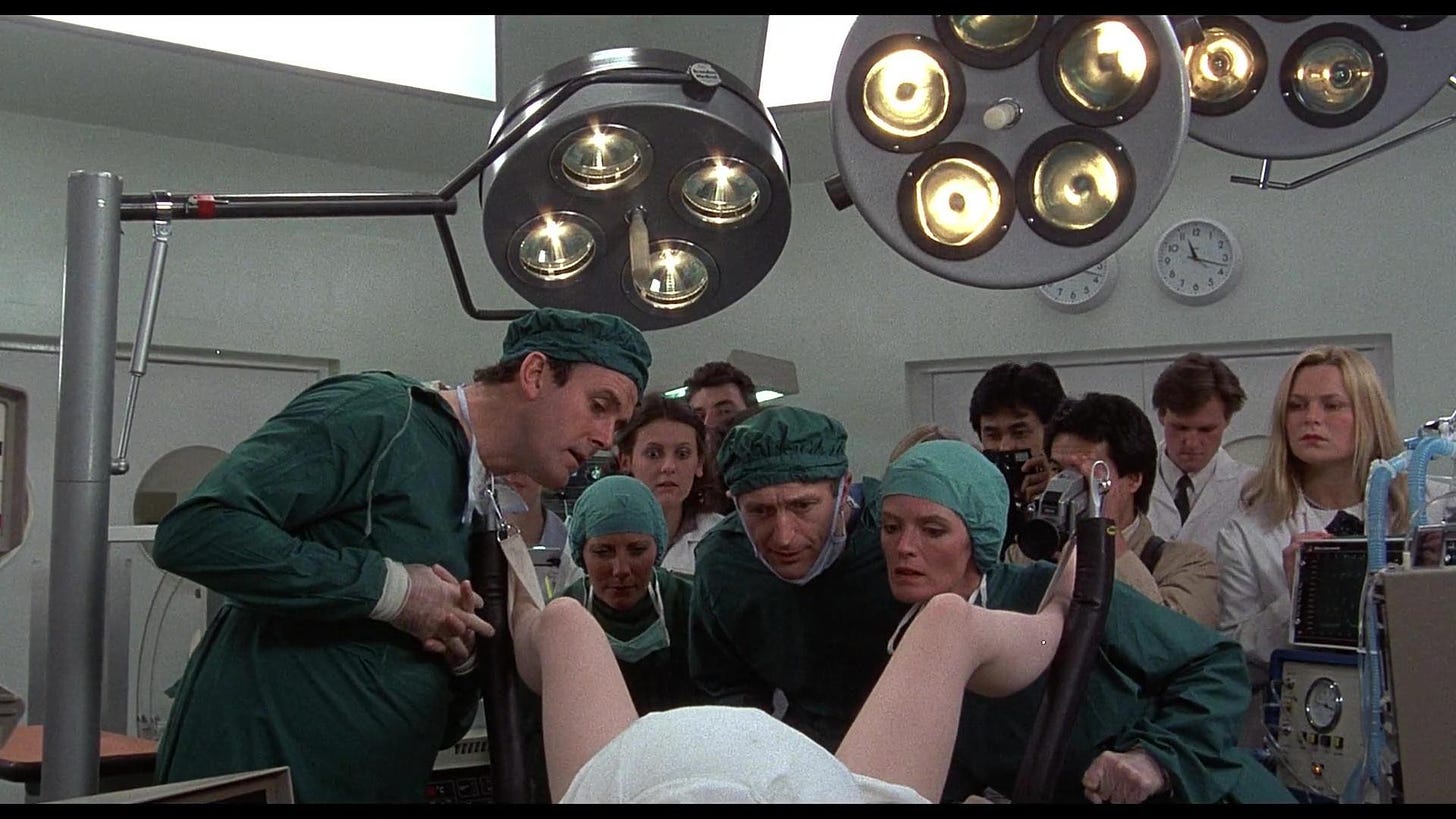- The Library of Babel
- Posts
- Psychedelics are not a cheat code to enlightenment
Psychedelics are not a cheat code to enlightenment
The story of how I came to realize that
I've been there. Specifically, in my friend's backyard, extremely high on LSD, arranging and rearranging the clouds in the sky for hours. When the stars finally came, they were huge and bright. Van Gogh bright.
I may be overselling how close my friend and I were. While now I do consider this man to be my friend—3 years after the story I'm telling you about happened—we started talking online only a few months before I first met him and went to his house. We talked mainly about occult stuff, and a bit about psychedelics – which he seemed to know an awful lot about.
As we got to know each other over text, I shared with him the deep rot I felt in. I was bored with my job, hated working alongside an ex (it didn't end well), and felt like I was going nowhere. Writing didn't excite me anymore—my boss loved making sure of that when he ridiculed my articles—and the novel I'd been working on for the past 4 years was... well, it was time to accept that I couldn't write a novel with no plot. Let's just leave it at that.
I wanted to change my situation, and what I believed could do it was something shockingly different from what I'd tried before—which in my mind was psychedelic drugs. Luckily for me, my new friend knew where to get them. He kindly offered me to come stay at his house for a night and to take some, while he would make sure I was safe.
So, I decided to accept this half-stranger's invitation, go to his house, and hopefully find myself there. I don't remember much about what happened—his dog was weirdly aggressive when I played with him, the synthetic grass whispered things I don't recall, and the ants on it formed interesting patterns as I stared at them. After that 12-hour trip, I came back to my apartment with a realization: I shouldn't be doing stupid stuff like that.

As long as I can remember, I've always wanted to understand the universe. I had no idea what that actually meant, but I wanted to know, and to know more.
I remember as a young boy, probably 6 or 7, stuck deep inside my head during a break in school, working out by myself the existence of vowels and consonants. I was so proud of my awesome ability that I never told anyone about my discovery. It was like a big secret, a hint toward deciphering this world and – maybe, I thought – controlling it in some way. Other discoveries came later, mostly banal in hignsight.
To a large extent, this is still the case. Still how I fundamentally operate. Yes, I'm that type of (annoying) person who is always on the lookout for a new understanding. What Joyce so brilliantly called epiphanies—borrowing a religious term to articulate a vital secular truth—that there is nothing ordinary about our daily lives.
I almost never step into a shower without some nugget to ponder over, something to figure out. Don't get me wrong, it's not always or mostly a metaphysical question. More times than not, it's practical, even technical. For the past few showers, I've been thinking about how to better attract new readers through my X account.
My wife always jokes that whenever I'm faced with a challenge, I try to solve it by learning about it. This could be helpful, of course, but at some point, you run into the problem of: well, you can't lose weight by studying about your body chemistry. Or just by reading about eating better. You should actually eat better and work out.
And so, when at the age of 16, I discovered Buddhism, the concept of enlightenment (which I saw more as a promise really) blew my mind. I wanted it for what it could give me.
The story of the man who once sat under a tree in faraway India, then stood up and told everyone they could be like him—free from suffering—and explained how to reach that state; that story captured my mind and excited me to no end.
There are many ways to tell every story, and the story of the Buddha reaching enlightenment is no different. The more religious telling focuses on the miracle of that moment, the Buddha sitting underneath the Bodhi tree and the whole world stopping. Flowers opening themselves to him, birds chirping in joy. I used to love this telling. Now I prefer the secular version. The Buddha himself maintained all his life that he was just a man, not a god. And that actually, the gods are too busy with their eternal lives to even notice the suffering that all beings experience—that even they suffer—which is the first understanding on the path to enlightenment.

It is embarrassing to say this, but I feel like for years I've conflated images of the Buddha with other, much more childish scenes taken from action movies—especially of superheroes. Knowledge and better understanding lead one to develop superpowers, didn’t they? The Buddha became a stand-in for a spiritual Bruce Lee, with a touch of Wolverine on top.
That is why I was especially primed to seek knowledge with psychedelics. I tried meditation for years, and while it did work for me, the secret and foolish belief in an instant transformation was much more enticing than the grind of a daily practice. I didn’t really think I would get my cool superpowers from taking a tablet of LSD, like it’s a radioactive spider bite, though I wouldn’t be totally shocked if I did, to be honest. I was half sure that if the trip was right and I came prepared, I could figure out all of my problems—for perpetuity (which in my experience means probably a year or two ahead). The image was a ready-made one: the shaman guiding you to new territory.
My shaman, by that I mean my friend, was much more concerned I wouldn't pass out from thirst. So, he kept me well-hydrated. Instead, I was left alone to come to whatever realization I was seeking.
The most fundamental truth I have come to in my undirected, random, and odd investigations—what others call life or living—is that the human being is always here—wherever it is—and always wants to be there—wherever it is. There is no destination that we can reach to be forever satisfied. That’s why I don’t believe there is such a thing as enlightenment, you can come to terms with your desires but never really lose them. Not really. There are bigger and smaller understandings—the Buddha had some major ones—with shades of grey coloring and blurring the picture constantly. And there is, and I learned this in my humanities degree ad nauseam, more and more (endless) perspectives on the same thing.
Since that unenlightening experience with LSD, I quit my job, met my wife, and started writing here—in a foreign language and about the things that really interest me and move my heart. For now, I feel satisfied, but who knows for how much longer?
In closing, I want to return to the one important insights I did gain from my one psychedelic experience—and that is to stop chasing after bullshit experiences and take care of myself instead. But this time, I wish to let Monty Python say it.
Want to know the meaning of life? It’s very simple. Just image a bored hostess reading blandly from an envelope:
It’s nothing very special, really. Try and be nice to people, avoid eating fat, read a good book every now and then, get some walking in, and try and live together in peace and harmony with people of all creeds and nations.
I know what you think, how boringly trivial. I want to be somewhere else already.

One last side note:
There is of course real danger in using powerful substances.
In his very interesting first book, the scholar and pop (oc)culture writer Erik Davis talks about psychedelics—amongst a lot of other technologies—as "neither Devil nor angel", But not a neutral tool either. Psychedelics are much closer to the trickster in nature. The trickster can bring you new knowledge—because of his transient nature, always moving from place to place causing mayhem, he is a force for change. But like a fairy, the trickster isn’t interested in your benefit, not primarily and most likely not at all. He has his own set of goals, his own journey. You shouldn’t trust him blindly to bring you where you want. He can, but while some mistake him for a tour guide—he is actually the ultimate tourist. Making him the driver has its very real dangers. He is not necessarily going to stop exactly when and where you want him to stop, and he is going to show you things along the way you might never have wanted to see in the first place.
So while I’m not against using psychedelics, I think that the people who oppose them overemphasize the dangers (you’ll get addicted from a puff of weed), and the people who champion them usually tend to ignore the risks altogether.